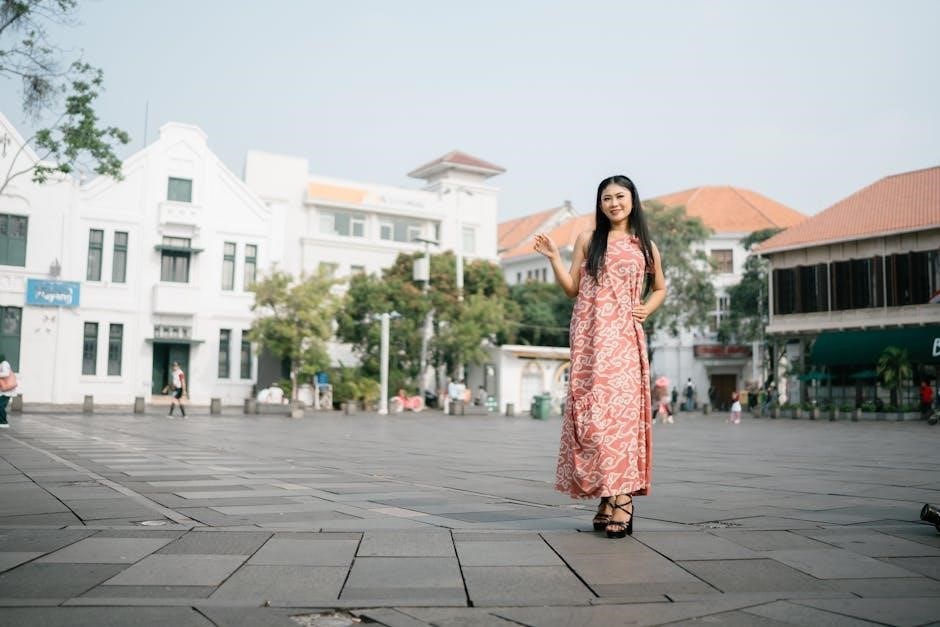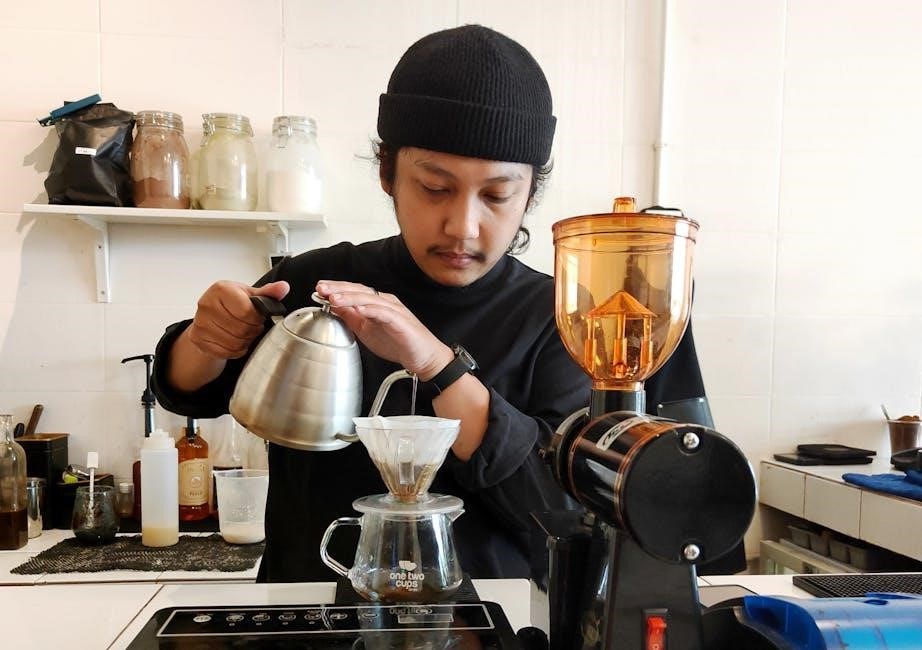
The Jakarta Method: Washington’s Anticommunist Crusade and the Mass Murder Program That Shaped Our World is a groundbreaking political history book by Vincent Bevins.
It explores the 1965-66 mass killings in Indonesia and U.S. involvement in anticommunist campaigns globally, revealing how these events shaped modern geopolitics and Cold War strategies.
1.1 Background and Overview
The Jakarta Method: Washington’s Anticommunist Crusade and the Mass Murder Program That Shaped Our World is a political history book by Vincent Bevins.
It examines the 1965-66 mass killings in Indonesia and the U.S.-backed anticommunist campaigns across Latin America, offering a fresh perspective on Cold War geopolitics and its enduring impact on global politics.
1.2 Importance of the Topic
The Jakarta Method sheds light on a dark chapter of Cold War history, exposing the U.S. role in mass killings and anticommunist campaigns in Indonesia and Latin America.
It highlights the far-reaching consequences of these events, revealing how they shaped global politics, U.S. foreign policy, and modern geopolitical dynamics, making it a vital read for understanding international relations and historical justice.
Historical Context of The Jakarta Method
The Jakarta Method is set against the backdrop of the Cold War, highlighting Indonesia’s political turmoil in the 1960s and the U.S. role in shaping global anticommunist strategies.
It examines how geopolitical tensions and ideological conflicts led to mass violence, offering a critical perspective on historical events that defined modern international relations and power dynamics.
2.1 The Cold War and Its Impact on Global Politics
The Cold War shaped global politics through intense ideological rivalry between the U.S. and Soviet Union, leading to proxy wars and anticommunist campaigns worldwide.
This era of geopolitical tensions influenced Indonesia’s 1965-66 mass killings and Latin America’s military coups, as nations aligned with Western powers to suppress leftist movements, setting the stage for widespread human rights violations and long-lasting political upheaval.
2.2 Indonesia in the 1960s: Political Unrest and Mass Killings
Indonesia in the 1960s faced severe political turmoil, culminating in the 1965-66 mass killings of communists, leftists, and ethnic Chinese, with estimates suggesting up to one million deaths.
The U.S., fearing communist expansion, supported the Indonesian military’s anticommunist purge, which reshaped the nation’s political landscape and left deep scars, as detailed in The Jakarta Method.
Key Themes in The Jakarta Method
The Jakarta Method explores the U.S. role in anticommunist campaigns and the mass murder program in Indonesia, highlighting its global impact and historical significance.
It examines how Cold War strategies shaped violent political transitions worldwide, offering a critical perspective on U.S. foreign policy and its lasting consequences.
3.1 The Role of the United States in Anticommunist Crusades
The United States played a pivotal role in anticommunist campaigns globally, particularly in Indonesia and Latin America, as detailed in The Jakarta Method.
Bevins reveals how U.S. support for authoritarian regimes and covert operations facilitated mass killings and political upheaval, shaping Cold War geopolitics and leaving lasting scars on human rights and international relations.
3.2 The Mass Murder Program and Its Consequences
The Jakarta Method uncovers the devastating consequences of the mass murder program in Indonesia, backed by the U.S., which resulted in the deaths of approximately one million civilians.
This atrocity not only eradicated political opposition but also instilled fear, consolidating authoritarian rule and setting a precedent for similar interventions worldwide, as explored in Bevins’ detailed analysis.
Case Studies from The Jakarta Method
The book examines case studies of U.S.-backed anticommunist campaigns in Indonesia and Latin America, highlighting their interconnectedness and global impact.
4.1 The 1965-66 Mass Killings in Indonesia
The 1965-66 mass killings in Indonesia resulted in the deaths of approximately one million civilians, targeting communists and alleged leftist sympathizers.
The U.S. provided critical support to the Indonesian military, facilitating the anticommunist purge, which reshaped the nation and set a precedent for Cold War-era interventions globally.
4.2 Military Coups in Latin America
The Jakarta Method examines U.S.-backed military coups in Latin America, notably the 1964 Brazil coup, as part of a broader anticommunist strategy during the Cold War.
These interventions installed authoritarian regimes, suppressed leftist movements, and mirrored the Indonesian massacres, highlighting a pattern of U.S. involvement in violent political transformations across the Global South.

Author’s Perspective and Research
Vincent Bevins, a renowned journalist, offers a fresh perspective on U.S. foreign policy during the Cold War, blending meticulous research with compelling storytelling.
His investigative approach uncovers hidden histories, drawing from diverse sources to expose the global impact of anticommunist interventions and their lasting consequences.
5.1 Vincent Bevins and His Journalistic Approach
Vincent Bevins, a journalist with extensive international experience, employs a meticulous and engaging approach in The Jakarta Method.
His work combines deep archival research with personal interviews, providing a comprehensive understanding of U.S. foreign policy and its global implications.
Bevins’ storytelling weaves historical events with contemporary relevance, making complex geopolitics accessible to a broad audience.
5.2 Sources and Methodology in The Jakarta Method
Vincent Bevins’ research in The Jakarta Method relies on declassified documents, archival records, and interviews with key figures.
His methodology combines rigorous historical analysis with personal narratives, ensuring a balanced and detailed account of U.S. involvement in global anticommunist campaigns.
Bevins’ approach emphasizes cross-border connections, offering a transnational perspective on Cold War strategies and their lasting impact.

Reception and Reviews of The Jakarta Method
The Jakarta Method received critical acclaim, named one of the best books by NPR, Financial Times, and GQ, hailed as a “radical new history” by the Wall Street Journal.
6.1 Critical Acclaim and Awards
The Jakarta Method received widespread critical acclaim, earning recognition as one of the best books of the year by NPR, Financial Times, and GQ.
It was praised by the Wall Street Journal as a “radical new history” of U.S. foreign policy, highlighting its rigorous research and compelling narrative.
The book’s insightful exploration of Cold War geopolitics and its impact on global events solidified its place as a significant work in modern historical literature.
6.2 Controversies and Criticisms
While The Jakarta Method has been praised for its groundbreaking research, it has also sparked debates among historians and scholars. Some critics argue that Bevins oversimplifies complex historical events, particularly the role of local actors in the Indonesian massacres.
Additionally, the book’s focus on U.S. involvement has drawn criticism for potentially downplaying the agency of Indigenous forces in shaping these tragedies, leading to mixed reactions in academic circles.
The Legacy of The Jakarta Method
The Jakarta Method has left a lasting impact on historical narratives, offering a critical lens on U.S. foreign policy and its global repercussions, sparking essential discussions.
7.1 Impact on Historical Understanding
The Jakarta Method reshapes historical understanding by exposing the U.S. role in global anticommunist violence, particularly in Indonesia and Latin America.
It reveals how Cold War strategies led to mass atrocities, challenging traditional narratives and providing a more nuanced view of geopolitical interventions.
Bevins’ research highlights the long-term consequences of these events on global stability and human rights, offering a critical perspective on historical justice.
7.2 Reflections on Modern Foreign Policy
The Jakarta Method offers critical insights into modern foreign policy by examining historical U.S. interventions and their repercussions.
It underscores the dangers of ideological crusades and the importance of ethical considerations in international relations.
Bevins’ work serves as a cautionary tale, urging policymakers to learn from past mistakes and prioritize human rights in geopolitical strategies.

The Jakarta Method and Modern Relevance
The Jakarta Method highlights the enduring impact of Cold War strategies on contemporary geopolitics, offering lessons on the dangers of ideological interventions and their long-term consequences.
8.1 Lessons for Today’s Geopolitical Landscape
The Jakarta Method reveals how Cold War-era strategies shaped global instability, offering insights into modern geopolitical challenges. The book underscores the dangers of ideological interference, regime change, and covert operations, providing critical lessons for understanding contemporary foreign policy and human rights issues.
8.2 Educational Value and Awareness
Vincent Bevins’ The Jakarta Method serves as a vital educational resource, shedding light on lesser-known atrocities and U.S. foreign policy’s historical impact. It raises awareness about global injustices and encourages readers to critically examine the legacy of Cold War interventions, fostering a deeper understanding of their relevance to contemporary issues and human rights advocacy.

Where to Find The Jakarta Method PDF
The Jakarta Method PDF can be purchased from official sources like Amazon, Barnes & Noble, or PublicAffairs. Free access may be available through libraries or previews online.
9.1 Official Sources and Purchasing Options
The Jakarta Method PDF is available for purchase on platforms like Amazon, Barnes & Noble, and PublicAffairs. Readers can also find it on Google Books and other major online retailers. Ensure authenticity by buying from these trusted sources to support the author and publisher. Additionally, check local bookstores for availability in paperback or eBook formats.
9.2 Free Access and Legal Considerations
Accessing The Jakarta Method PDF for free may violate copyright laws. Unauthorized downloads from unverified sources can lead to legal consequences and support piracy. Always opt for official channels to ensure compliance with intellectual property rights and support authors and publishers ethically. Illegal distribution harms the literary community and undermines the value of original content.
Discussion Questions and Analysis
Explore the ethical implications of U.S. involvement in global anticommunist campaigns. How do historical events shape modern geopolitical strategies? What lessons can be drawn from Indonesia’s 1965-66 mass killings?
10.1 Key Points for Debate
Discuss the moral implications of U.S. involvement in anticommunist campaigns worldwide. Debate the long-term consequences of Indonesia’s 1965-66 mass killings. Consider the role of Cold War ideologies in shaping modern geopolitics. Analyze how historical events influence contemporary foreign policy decisions. Reflect on the balance between national security interests and human rights violations. Explore the lessons learned from these events for today’s global strategies.
10.2 Encouraging Critical Thinking
Encourage readers to question historical narratives and analyze evidence presented in The Jakarta Method. Discuss how the book challenges perceptions of U.S. foreign policy and its global impact. Ask readers to reflect on ethical dilemmas and the long-term consequences of geopolitical actions. Promote deeper engagement by relating historical events to modern issues like propaganda, power imbalances, and human rights.
The Jakarta Method reveals the dark legacy of U.S. foreign policy, emphasizing the need to understand historical atrocities for a just and informed future.
11.1 Summarizing the Key Insights
The Jakarta Method exposes the U.S. role in the 1965-66 Indonesian mass killings and other anticommunist campaigns, revealing their profound impact on global politics. It emphasizes the importance of understanding these historical atrocities to inform modern foreign policy and promote justice and awareness.
11.2 The Enduring Significance of The Jakarta Method
Vincent Bevins’ work remains a vital resource for understanding Cold War geopolitics and its ongoing influence. By linking historical atrocities to modern policies, it provides a critical lens for analyzing global power dynamics, ensuring that the lessons of the past inform a more just and equitable future.
Further Reading and Resources
Explore books like The Jakarta Method for insights into Cold War geopolitics. NPR, Financial Times, and GQ recommend it as a vital read for understanding U.S. foreign policy and global political dynamics.
12.1 Recommended Books on Related Topics
For deeper insights, explore books like Killing Hope by William Blum, The Open Veins of Latin America by Eduardo Galeano, and Sideshow: Kissinger, Nixon, and the Destruction of Cambodia by William Shawcross.
These works complement The Jakarta Method by examining U.S. foreign policy, Cold War interventions, and their global impacts, offering a broader understanding of geopolitical dynamics and historical context.
12.2 Online Resources and Documentaries
Explore documentaries like The Look of Silence and The Act of Killing for visual insights into Indonesia’s 1965-66 mass killings.
Online resources such as Amnesty International reports, Cold War archives, and academic journals provide additional context, while podcasts like The History of the Cold War offer complementary perspectives on U.S. foreign policy and its global implications.



